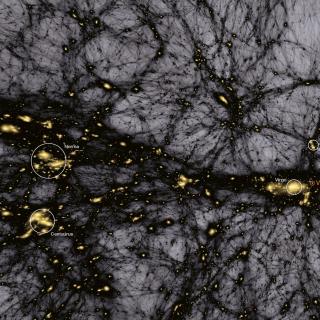Bibcode
Wang, Y.; Zhao, Gong-Bo; Chuang, Chia-Hsun; Pellejero-Ibanez, M.; Zhao, Cheng; Kitaura, F.-S.; Rodriguez-Torres, Sergio
Referencia bibliográfica
Monthly Notices of the Royal Astronomical Society, Volume 481, Issue 3, p.3160-3166
Fecha de publicación:
12
2018
Número de citas
57
Número de citas referidas
52
Descripción
We perform a tomographic analysis of structure growth and expansion rate
from the anisotropic galaxy clustering of the combined sample of Baryon
Oscillation Spectroscopic Survey (BOSS) Data Release 12, which covers
the redshift range of 0.2 < z < 0.75. In order to extract the
redshift information of anisotropic galaxy clustering, we analyse this
data set in nine overlapping redshift slices in configuration space and
perform the joint constraints on the parameters \big [D_ V × (r_
d^fid/r_ d), F_{AP}, fσ _8\big ] using the correlation function
multipoles. The analysis pipeline is validated using the
MultiDark-Patchy mock catalogues. We obtain a measurement precision of
1.5{{ per cent}}-2.9{{ per cent}} for D_ V × (r_ d^fid/r_ d),
5.2{{ per cent}}-9{{ per cent}} for FAP, and 13.3{{ per
cent}}-24{{ per cent}} for fσ8, depending on the
effective redshift of the slices. We report a joint measurement of \big
[ D_ V × (r_ d^fid/r_ d), F_{AP}, fσ _8\big ] with the full
covariance matrix in nine redshift slices. We use our joint baryon
acoustic oscillations and redshift-space distortions measurement
combined with external data sets to constrain the gravitational growth
index γ, and find γ = 0.656 ± 0.057, which is
consistent with the Λ Cold Dark Matter (ΛCDM) prediction
within 95 per cent confidence level.
Proyectos relacionados

Cosmología con Trazadores de la Estructura a Gran Escala del Universo
El Fondo Cósmico de Microondas (FCM) contiene la información estadística de las semillas primigenias que han dado lugar a la formación de todas las estructuras en el Universo. Su contrapartida natural en el Universo local es la distribución de las galaxias que surgen como resultado del crecimiento gravitatorio de aquellas fluctuaciones de densidad
FRANCISCO SHU
KITAURA JOYANES